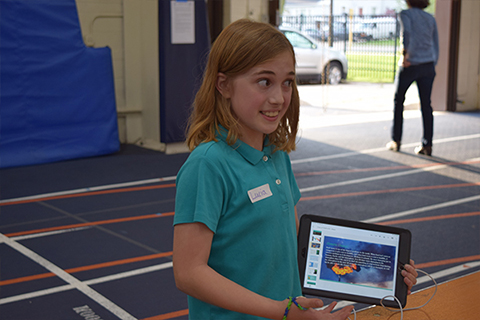Evanston Sixth Graders Use ‘Design Thinking’ to Tackle Climate Change
 A straw made from wheatgrass, stormwater ice cream, and a food waste prevention app were just some the solutions Evanston sixth graders devised to address climate change as part of the first citywide project-based learning showcase.
A straw made from wheatgrass, stormwater ice cream, and a food waste prevention app were just some the solutions Evanston sixth graders devised to address climate change as part of the first citywide project-based learning showcase.
The inaugural event, a collaborative effort between Evanston/Skokie School District 65, Northwestern University, EvanSTEM, and a host of community partners, challenged the districts’ 900 sixth-grade students to use the ‘design thinking’ process to explore the best ways to mitigate the human impact on the environment.
Design thinking emphasizes empathy, brainstorming, and testing ideas. After students picked an issue outlined in the city’s Climate Action and Resilience Plan – waste, excessive heat, stormwater runoff, or invasive species and pests -- they were tasked with conducting research, developing solutions, and creating prototypes to test their ideas.
Participants also were encouraged to create a digital science project journal with iPads using District 65’s online learning platform (EL3), which was developed by Northwestern School of Education and Social Policy learning scientist Nichole Pinkard.
More than a search tool, EL3 can help young people track their learning. “Each program they attend, skill they master, app they conquer, and project they complete via EL3 is part of their learning profile,” Pinkard said.
The two-month project, called the Citywide 6th Grade STEAM Project Showcase 2019, culminated with a showcase at Evanston Township High School. Students presented their solutions to judges -- Northwestern University student volunteers – and Evanston Mayor Steve Hagerty.
Kevin Connell, the 12-year-old son of SESP alumna Lynette Connell (BS89) developed "Package Points," an app designed to offer rewards for reusing bags. Another team created ice cream made with rainwater, advising that it's important to boil the water before freezing it.
“When everything comes together, it’s very satisfying,” said Connell, the 12-year-old son of SESP
alumna Lynette Connell (BS89). “But there were definitely some hard parts.”
Added Mara Matthews, a sixth grader from Haven Middle School who made wheatgrass straws to reduce plastic, “My favorite part was experimenting. At first, I had failures, but it was part of the experience.”
Students could work on their projects at a variety of out-of-school maker-lab locations, including the Evanston Public Library, the YMCA’s MetaMedia McGaw and MetaMedia Foster, Y.O.U., and the Evanston Art Center.
These community sites provided access to 3D printers, laser cutting, cardboard engineering, a heat press, sewing materials, and more.
Adults from youth-serving centers, meanwhile, including the Evanston Public Library and McGaw YMCA MetaMedia, worked with students and teachers in the classrooms and environmental experts were available for interviews during school.
“Students weren’t just relying on Google,” said Kirby Callam, director of EvanSTEM, a public-private partnership STEM access project housed within District 65. “We created a hands-on project-based learning environment in the schools, and the out-of-school folks also lent their skills and experience.”